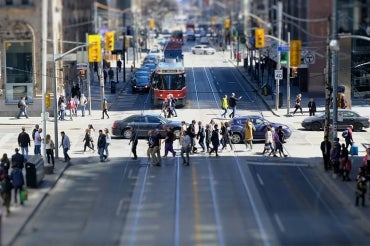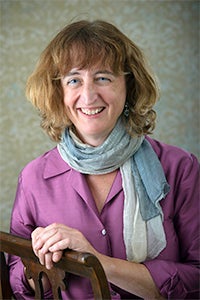Experts from U of T, city and other post-secondary institutions meet to discuss pandemic recovery

(Photo by Evgeny Klein/EyeEm via Getty Images)
Published: November 19, 2021
Students, faculty and staff from eight post-secondary institutions, including the University of Toronto, will meet with officials from the City of Toronto for a free, two-day virtual event focused on developing an equitable and inclusive pandemic recovery policy framework.
 Karen Chapple
Karen ChappleThe CivicLabTO Academic Summit, to be held on Nov. 23-24, will focus on issues such as public health, housing, transit, transportation, climate change, green recovery and the future of public space. It will tap leading experts from the city and local post-secondary institutions to share best practices.
The event, hosted by York University, will also examine potential partnerships, innovations and solutions through the lens of equity and inclusion.
Writer Ravisha Mall recently spoke with Karen Chapple, director of U of T’s School of Cities and a professor in the department of geography and planning, about the impetus for the broader partnership between the city and the eight post-secondary institutions and the potential for such events to contribute to the development of a “Toronto School” of urbanism.
Why is this type of discussion happening now?
Crises of all kinds produce openings for radical change. Yet, this particular moment is not just the simple convergence of multiple crises – pandemic, climate change, income inequality, resurgent nationalism and systemic racism – but a juncture that is reaffirming the need for collective action. As much as we hate the masks and distancing, dread the climate extremes and feel upset or oppressed by the ongoing political, economic and cultural polarization, we still share hope. And we can take comfort in the fact that our institutions continue to push on. We are in it together, we learn and that’s inspiring.
How have you seen cities and academic institutions collaborate effectively to create real change?
One obvious example is the University of Chicago’s civic engagement program, which makes sure that disadvantaged high school students have a pipeline into college, builds civic capacity in the community and ensures that local universities procure from local businesses. I love this example because a university that was the birthplace of urban sociology 100 years ago continues to this day with intense empirical urbanism that has transformed both how we think about cities and how we empower their communities. As I look at the many disciplinary perspectives coming together in CivicLabTO to address urban challenges, I get excited about the potential for a “Toronto School” that is just as transformative as the Chicago School.
I would also note that, during the pandemic, U of T also found many ways to support municipalities, including hosting vaccination clinics across the tri-campus, rethinking aging apartment towers and supporting small businesses.
What is the School of Cities’ role in all of this?
We are the School of, for, and by Cities. We build and translate knowledge about cities, we connect communities and stakeholders around the world to support sustainable urbanism and we make sure that our urban residents have the capacity and power to create their own communities. To borrow from Toronto’s own David Miller, the former mayor, we see the cities as the solution to the crises we face. So, we teach the world why cities matter so much for our future.
Leveraging the work being done across the university’s divisions, the School of Cities curated a list of speakers for the event – many of whom contributed to public policy during the pandemic and are providing advice in the recovery.
Here is a list of members of the U of T community, including students and faculty, who are scheduled to appear at the summit:
- Matti Siemiatycki, department of geography and planning, Faculty of Arts & Science
- Catherine Chandler-Crichlow, School of Continuing Studies
- Mark Campbell, department of arts, culture and media, U of T Scarborough
- Beth Coleman, Institute of Communication, Culture, Information and Technology, U of T Mississauga
- Andrew Boozary, Dalla Lana School of Public Health and University Health Network
- Andrew Bond, department of family and community medicine, Temerty Faculty of Medicine
- Shoshanna Saxe, Faculty of Applied Science & Engineering
- Menilek Beyene, PhD student at U of T Scarborough
- Zahra Ebrahim, department of geography and planning, Faculty of Arts & Science



